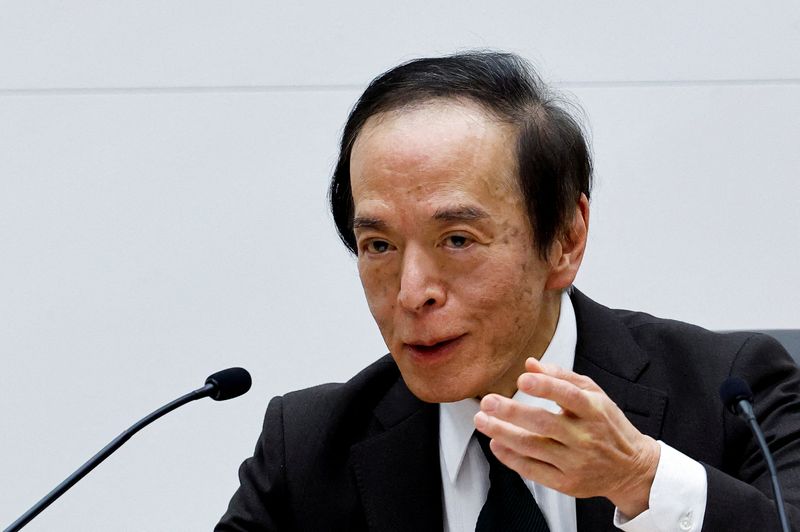Lake Kihara
TOKYO (Reuters) – Bank of Japan Governor Kazuo Ueda said the central bank would not react directly to currency changes when setting monetary policy, rejecting market speculation that a sharp fall in the yen could force it to raise interest rates.
But Ueda maintained his optimism about the wage outlook and signaled the likelihood of another rate hike if inflation, still below 2%, moves closer to forecast levels.
“We will absolutely not change monetary policy directly in response to changes in the exchange rate,” Ueda told parliament in response to a question from an opposition lawmaker about whether the yen’s movements would have any impact on the Bank of Japan’s decision on the timing of its next rate hike. .
A weak yen could push up import prices, but that alone won’t lead to higher rates, Ueda said, stressing that the key is whether such upward price pressure will feed into broader inflation and wage growth.
“If there is a risk that wages and inflation could rise more than expected and push inflation above 2%, we may have to consider changing monetary policy,” he said on Wednesday.
The yen is trending lower following the Bank of Japan’s historic policy change that ended eight years of negative interest rates as markets interpreted its dovish outlook as a sign that further rate hikes are some time away.
The yen held at 151.80 to the dollar on Wednesday, within reach of a 34-year low of 151.975 hit last month, prompting warnings from Tokyo authorities of the possibility of currency intervention to buy the yen.
Ueda said the BOJ’s decision to exit ultra-loose policy in March was based on its view that sustained achievement of its 2% inflation target was on the horizon.
Waiting too long to exit would raise the risk of inflation overshooting, which could force the Bank of Japan to aggressively raise interest rates, he said.
There are signs of a shift in corporate behavior, with more firms seeing opportunities to raise prices and wages, Ueda said.
“If the inflation trend matches our forecast, it might be appropriate to adjust the degree of monetary stimulus, although we do not know when that will happen,” he said.
The Bank of Japan’s new quarterly forecasts for economic growth and inflation, to be presented at its next policy meeting on April 25-26, will likely provide a clue about how soon the bank might next raise rates, analysts said.
A forecast released Wednesday by the Japan Center for Economic Research, a think tank, showed most economists forecast at least one more rate hike this year.
Some market players believe a weak yen could be one of the factors triggering the Bank of Japan’s next rate hike, which many economists believe will happen later this year.

While the weak yen boosts exports, it has become a source of headache for policymakers as it hurts households and retailers by raising the cost of importing raw materials.
Ueda says trend inflation is defined as price movements that remove the impact of one-time factors such as fuel costs, and is measured by looking at various indicators of how the strength of the economy and domestic demand affect prices.


